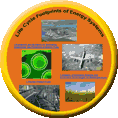CEER PROGRAM DIRECTORY
Air Resource Engineering (ARE)
Atmospheric Physicochemical Processes (APP)
Building Energy & Environments (BEE)
Pawel Misztal
Zoltan Nagy
Sergio Castellano
Process Energetics Program (PREP)
Aleta Wilder
Karl Stephan
Process Science & Technology Center
Separations Research Program (SRP)
Texas Industries of the Future (TIOF)
Coming Soon!
CEER Seminar Series
ENERGY RESEARCH
Current and recent projects related to Energy are listed below:
 |
LIFE CYCLE FOOTPRINTS OF ENERGY SYSTEMS Analysis of Innovative Feedstock Sources Corn and soy are currently used to produce nearly all of the biofuels (ethanol and biodiesel) in the United States. Cellulosic ethanol, while not currently produced in large quantities, is also considered to be a promising biofuel pathway. The purpose of this study was to consider alternative feedstocks that could be converted to biodiesel or ethanol using the well understood processes of fermentation or transesterification and which are not currently used to make biofuels in the US. Four different feedstocks were considered: sugar cane, citrus waste, cottonseed, and microalgae. A Life Cycle Assessment (LCA) approach was used to examine the land occupation requirements, water use, net energy, and emissions to air, including greenhouse gases carbon dioxide (CO2), methane (CH4) and nitrous oxide (N2O). |
 |
|
TEXAS INDUSTRIES OF THE FUTURE (TIOF) TIOF was established in 2001 with funding from the US Department of Energy Office of Energy Efficiency and Renewable Energy through contracts with the Texas State Energy Conservation Office. The purpose of the Texas Industries of the Future program is to facilitate the development, demonstration and adoption of advanced technologies and adoption of best practices that reduce industrial energy usage, emissions, and associated costs, resulting in improved competitive performance for Texas industries. |
|
| The bottom line for Texas industry is savings in energy and materials, cost-effective environmental compliance, increased productivity, reduced waste, and enhanced product quality. | |
